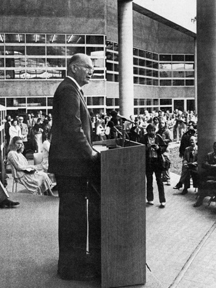By Pearce Edwards
In a landscape of higher education increasingly defined by prestige, revenue and services, a place still opens for the caretakers of the values of the liberal arts and sciences who uphold the traditions of rigorous inquiry, intellectual achievement, and a diverse acumen. The Delta of Texas Phi Beta Kappa chapter at Texas Christian University owes its existence one such caretaker, James M. Moudy (ΦΒΚ, Duke University, 1953). As TCU Chancellor from 1965 to 1979, Moudy typified the Southern scholar of his time, yet the liberal arts scholar did not in turn typify him. His cosmopolitanism, devotion to the Protestant Christian Church (Disciples of Christ) and inimitable presence of mind set the stage for TCU’s national reputation.
Born to a working-class South Texas family in 1916, Moudy’s parents made a living farming before a hurricane destroyed their crops. Moving to Greenville, Texas for the cotton industry and then Washington, D.C., after his father died, the young Moudy faced struggles for his own survival at an early age. He employed his musical talents in the 1933 inaugural parade band for Franklin D. Roosevelt and developed a lifelong passion for Christian ministry from local youth group sponsors Dr. and Mrs. Fred Norris.
After working in civil services for six years, Moudy enrolled at Texas Christian University in 1939 and quickly rose to the top of his class in academics, involvement, and leadership. Moudy drew on his hardscrabble roots to pay for college through strenuous construction work on the TCU campus. Graduating in 1943 with degrees in economics and sociology, he served nineteen months in the European Theatre with the 102nd Infantry Division before returning to seminary studies in Texas. By 1953 he had earned his doctorate from Duke University and a reputation as an “educational statesman” before beginning his lengthy service to TCU in 1957.
As TCU administrator and chancellor, Moudy made innumerable contributions to the capacity, access, and achievement of liberal arts education. He brought six research-oriented doctoral programs to the university, chaired the committee which founded the honors program in 1963, and conferred almost as many degrees in his fourteen years of leadership as had been conferred in the previous ninety at the university.
Moudy tasked TCU Vice Chancellor for Government Affairs Larry Lauer with announcing the Texas Tuition Equalization Grant (TEG) which improved private university access to students from low-income backgrounds. “Dr. Moudy was a part of designing it and he brought me involved to help in communicating it on a statewide basis,” Lauer said. “And I liked it, it was important, and it was a cause, it wasn’t just commercial promotion.”
“Moudy…was an incredibly bright and able administrator,” noted Chancellor Emeritus William Tucker. “When asked on one occasion to pick his most significant contribution as chancellor, he singled out the planting of a Phi Beta Kappa chapter on campus.” Bringing Delta of Texas to TCU in 1971 was a paean frequently on the lips of faculty and administrators describing Moudy, though Tucker also noted the stability, richness, and calm which Moudy gave to TCU.
In the turbulent 1960s and 1970s, Moudy brought prominent public figures to TCU, valuing the presence of Vice President Hubert Humphrey, President Lyndon Johnson, Texas Governor John Connelly, and President Gerald Ford. He served as Chairman of the National Council of Independent Colleges and Universities in 1975 and received accolades from civic groups as diverse as the business-minded Exchange Club and the social justice-minded National Conference of Christians and Jews.
The Christian Church (Disciples of Christ) denomination drove Moudy to his aspirations and achievements. Introspective and contemplative, he always held a desire to continue Christian ministry while keeping the tight bond between the university and the progressive denomination. Moudy chaired the Disciples of Christ Board of Higher Education from 1966 to 1968.
“Dr. Moudy was a very traditional Southern academic, but very much a gentleman,” remarked longtime Vice Chancellor Don Mills. “Dr. Moudy went blind before he left the office of the chancellor, but he would remember people by their voice.” A year after his blindness, Moudy retired in 1979 and passed away in 2004 at the age of eighty-eight.
Guided by his particularity for rules, his faith, and intellectual fervor, James M. Moudy exemplified a scholar-leader. Plato imagined a Philosopher-King, the Romans had the great Stoic Marcus Aurelius, and now a former law professor leads the United States of America. Moudy’s love of learning served as guide and example for the growth of TCU and expanded reach of Phi Beta Kappa.
Pearce Edwards is a senior at Texas Christian University double-majoring in political science and history. Texas Christian University is home to the Delta of Texas chapter of Phi Beta Kappa.
Photo above: On March 26, 1982, Chancellor Emeritus James M. Moudy spoke in the atrium of the building that bears his name, praising the university’s vision for the Journalism, Radio-TV-Film, Speech Communication, and Art programs. (From the TCU Magazine.)




